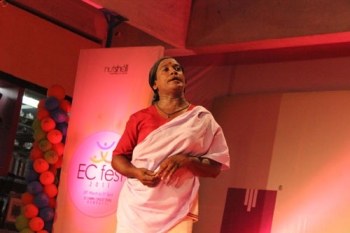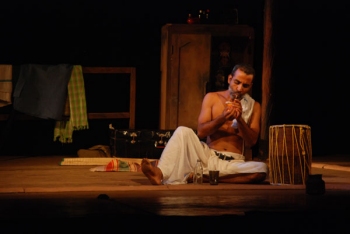
|   |

|   |
Cry for help - Padma Jayaraj e-mail: padmajayaraj@gmail.com June 7, 2013 Abhinaya Theatre based in Thiruvanathapuram, Kerala, believes ‘Art is for life’s sake.’ For this year’s Summer Theatre Festival, its research centre is staging women’s issues, especially the social evil that torments India today, the violence against women. The team started the journey from Kannur intending to traverse the length of Kerala. The Ministry of Cultural Affairs has sponsored their attempt to educate and sensitize people. The three-day festival at the School of Drama, Thrissur, saw a series of four plays. They address the reasons that may be related to the crimes against women - reasons that are political, religious and psychological. SAVITHRI KUTTY, a solo show, enacted by Chinnu Kuruvilat focuses on the day of a young wife in her marital home dulled by soul-killing drudgery and dehumanizing demands from other members of the family. Her husband is a hardworking man, not a villain. But, he is free in his own way having friends and time to himself outside home. However, she is taken for granted. Absence of love and care makes her home a prison, and loveless union physical violence. The social reality that kills a woman’s persona is crying for help, for equality. The superb solo performance of Appunni Sasi in THE CHOICE makes the play a riveting comedy. The title is a tongue-in-cheek remark that hints at its many dimensions. The theme of the play is marital discord where the woman is at the receiving end. The comic rendering, the play upon words, the flavor of a regional dialect are the specialties that the actor exploits. With great humanity, the writer Jayaprakas Kuloor manipulates characters that are caricatures in a mix of reality and fantasy. They narrate a social reality where the border lines blur. The woman backtracks through her past, pauses at the crossroads to think of lost choices which would have made life different for her. Through fact and fiction she tries to gain an edge over her husband, a habitual drunkard who tries to exploit situations to his advantage. As a couple in constant bickering, he enters into a rage. It is his prerogative as the master of the house to dictate terms. He justifies his trespasses, his actions, and his habits because he is the sole earning member. Yet, his philosophy smacks of practical wisdom. “Man has his ways and woman can have her ways, but relationship thrives on ‘adjustments.’” Even in his drunken fit he brings her a packet of milk, sugar and rice so that she can make the milk pudding she has been asking for quite some time. So here is ‘the adjustment’ that makes relationship lasting, some care that shows love is there like a firefly in enveloping gloom  The Choice  Sakharam Binder SAKHARAM BINDER is Malayalam adaptation of Vijay Tendulkar’s Marathi play. Patriarchal notions are challenged in the light of the strange chemistry of man-woman relationship. Sakharam, a cynic who traps homeless women to take care of his needs, learns his bitter lesson to tragic consequences. The persona of the woman is an enigma and human relationship is a baffling reality that cannot be trifled with. Enacted by consummate actors, the play is a powerful dramatization of psychological realism. The last in the series was a haunting play, really startling considering its relevance today. THE NEED TO GO BEYOND THE VICTIM is a multi-media presentation that deals with the theme of sexual violence against women, a crime that rocks the nation today. News clippings flashing on a screen, introduce the cotemporary reality in India. Crimes against women initiated by armed forces in conflict ridden zones are as cruel as the crimes hidden within the four walls of households where cries for help are smothered. Both the public space and her home are insecure for women. In front of the lighted screen, men and women walk to and fro like shadows oblivious of what happens in their world. Then, the lights focus on the seated figures on stage who tell harrowing tales of their tattered lives. A young girl, molested by her own father, is forced to live in hostels. A mother recalls, on the eve of her daughter’s marriage, her married life darkened by a sadist who is a popular political figure. The dowry she brought is the husband’s property. Having no other resources she cannot leave the house in search of safety. She has to endure all the humiliation in silence, a victim to his cruelty. The third tells of the blue-film induced sexual perversion of a man and his inhuman rejection by divorcing his pregnant wife, a tool in the hands of Muslim men with religious sanction. A grandmother narrates how she brought up her motherless granddaughter struggling against poverty, only to be raped and killed. She lives like a fury waiting to kill the criminal whom the court let free because of lack of evidence. A migrant Tamil woman tells how her infant girls were choked to death, a horrible version of female infanticide. And how she ran away to save her third daughter. In Kerala she, a refugee is repeatedly raped by the guardian of the law. There is the other side of the coin too. A young woman forced to quit her studies forgets everything in domestic bliss. When her children leave home she wakes up to the reality of an empty nest and a lonely life. The mid-life crisis leads her to establish a meaningful friendship which is dubbed as sexual entanglement. And she lives alone, rejected by her dear ones. The third part is a picture of the world of men, the perpetrators of the crime: a coalition of political, criminal, and law-enforcing heavy weights who use money and pimps to perpetuate crimes related to sex and violence. The drama exposes the hidden realities and the hypocrisy of sloganeering. The fourth part is a reality check - an interaction with audience where each actor steps down to tell the real story behind the dramatic presentation analyzing the situation. Made out of the stuff of life, with the immediacy that flashes news items, the presentation pushed the audience to wake up to a different reality. The impact was tremendous. A question mark hung in the air, haunting the conscience. People sat huddled in their seats in utter silence, unable to move or speak. Somewhere we feel duty bound to do something. It prods thinking minds to take to activism.  The need to go beyond the victim Kerala has a history of theater changing its perceptions. Communism as an ideology was popularized by theatre. Feudalism and caste discrimination were challenged in theatre. Although attitudes have undergone a sea change, the few who are passionate about theatre will carry the baton to further destinations. Padma Jayaraj is a freelance writer on the arts and travel. She is a regular contributor to narthaki.com |